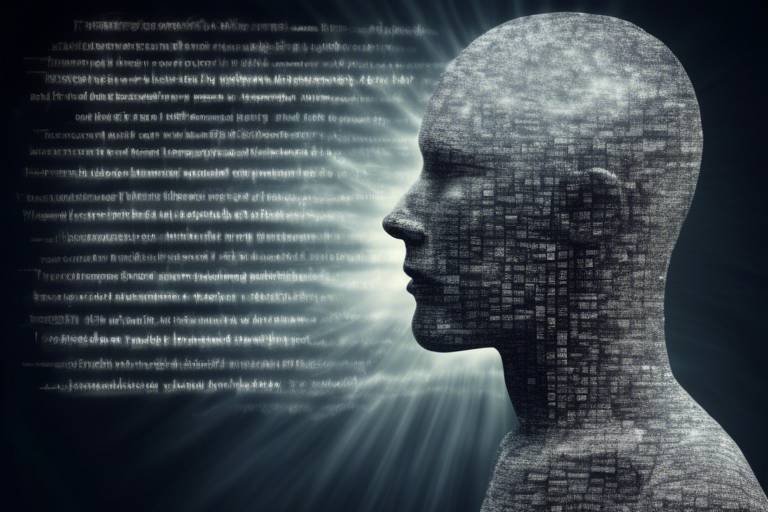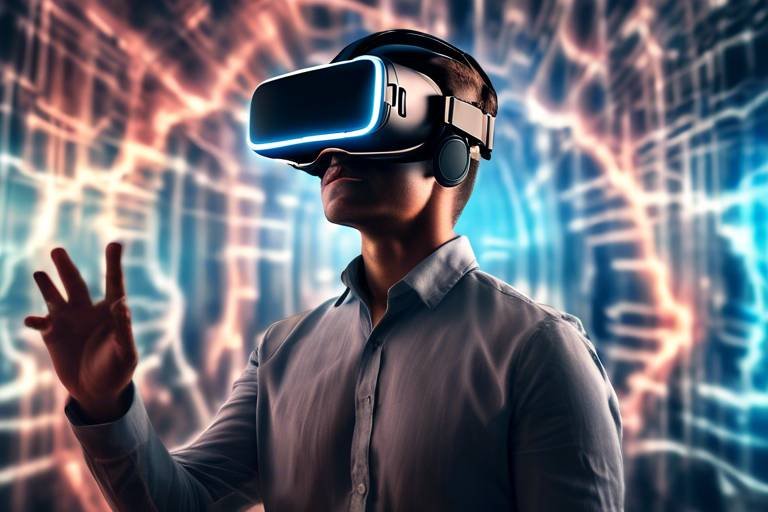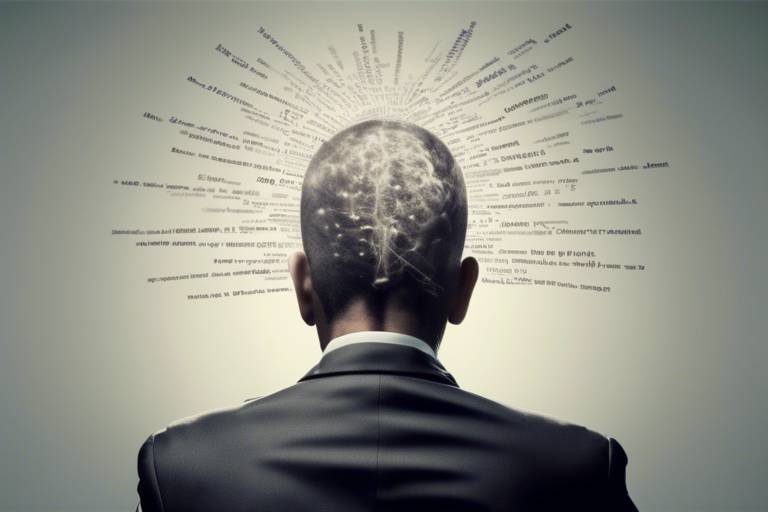Consciousness and Empathy - Are They Linked?
In the vast landscape of human experience, two concepts stand out as cornerstones of our social existence: consciousness and empathy. But have you ever wondered how these two intricate threads are woven together in the fabric of our lives? Understanding the connection between consciousness and empathy is not just an academic exercise; it has profound implications for how we relate to one another, how we build communities, and how we navigate the complexities of our emotional lives. As we dive deeper into this exploration, we will uncover the layers that link our awareness of ourselves and others to our capacity for empathy.
At its core, consciousness is the state of being aware of and able to think about one's own existence, thoughts, and surroundings. It’s the lens through which we experience the world. Imagine consciousness as the stage on which the play of life unfolds, where each actor (or person) has a unique role shaped by their perceptions and experiences. This stage is not static; it evolves as we grow, learn, and interact with others. It’s this dynamic nature of consciousness that sets the groundwork for empathy, allowing us to connect with the feelings and experiences of those around us.
Empathy, on the other hand, is the ability to understand and share the feelings of another. It’s what allows us to step into someone else's shoes, to feel their joy, pain, and everything in between. Think of empathy as a bridge that connects individual experiences, enabling us to resonate with each other on a deeper emotional level. Without the foundation of consciousness, this bridge would be weak and unstable, unable to support the weight of genuine human connection.
As we explore the relationship between consciousness and empathy, it’s essential to recognize that they are not merely linked but are interdependent. Our level of consciousness significantly influences our empathetic responses. For instance, when we are more aware of our own emotions and thoughts, we are better equipped to understand and empathize with others. This awareness acts like a mirror, reflecting back the emotions and experiences of those around us, helping us to forge deeper connections and foster a sense of community.
In summary, the interplay between consciousness and empathy is a fascinating dance that shapes our interactions and relationships. The more we understand this relationship, the better we can cultivate empathy in our lives, leading to a richer, more connected existence. So, as we continue this exploration, let’s delve into the specific characteristics of consciousness and how they inform our capacity for empathy.
- What is the difference between consciousness and empathy?
Consciousness refers to our awareness of ourselves and our surroundings, while empathy is the ability to understand and share the feelings of others. - How does increased consciousness enhance empathy?
Greater awareness of our own emotions allows us to better recognize and connect with the emotions of others, fostering deeper empathetic responses. - Can empathy be learned or developed?
Yes, empathy can be cultivated through practices such as mindfulness, active listening, and engaging in diverse social interactions. - What role do mirror neurons play in empathy?
Mirror neurons help us mimic and understand the emotions of others, facilitating our ability to empathize and connect with their experiences.

The Nature of Consciousness
Consciousness is a fascinating and intricate phenomenon that has puzzled philosophers, scientists, and thinkers for centuries. At its core, consciousness can be defined as the state of being aware of and able to think about one's own existence, sensations, thoughts, and surroundings. But what does that really mean? Imagine walking through a bustling city, where every sound, sight, and smell competes for your attention. Your ability to process these stimuli, to feel joy at the sight of a sunset or sadness at a friend's plight, is a testament to the complexities of consciousness.
One of the most intriguing aspects of consciousness is its multifaceted nature. It encompasses various levels of awareness, from basic sensory experiences to profound self-reflection. Think of it like an onion; as you peel back the layers, you uncover deeper and deeper insights into the self and the world around you. This layered structure of consciousness is what allows humans to perceive and interpret their environment, engage in abstract thinking, and form emotional connections with others.
Moreover, consciousness is not static; it evolves and changes over time. For instance, the way a child experiences the world is vastly different from an adult's perspective. Children are often more in tune with their immediate surroundings, while adults may engage in more complex thought processes, reflecting on past experiences or planning for the future. This dynamic quality of consciousness adds another layer of complexity to our understanding of human experience.
In exploring the nature of consciousness, we must also consider its relationship with the brain. Neuroscience has made significant strides in uncovering how brain activity correlates with conscious experience. For example, certain neural pathways are activated when we engage in self-reflection or empathize with others. This connection between brain function and consciousness raises important questions about the extent to which our awareness shapes our reality.
To illustrate the relationship between consciousness and various cognitive functions, consider the following table:
| Cognitive Function | Role of Consciousness |
|---|---|
| Perception | Awareness of sensory input, allowing us to interpret and respond to our environment. |
| Memory | Conscious recall of past experiences influences decision-making and emotional responses. |
| Self-Reflection | Enables individuals to analyze their thoughts and feelings, fostering personal growth. |
| Empathy | Heightened awareness of others' emotions allows for deeper connections and understanding. |
In summary, the nature of consciousness is a complex interplay of awareness, perception, and cognitive function. It shapes not only how we experience the world but also how we relate to one another. As we delve deeper into the study of consciousness, we uncover the profound ways it influences our interactions and emotional connections, setting the stage for a richer understanding of empathy.

The Role of Empathy
Empathy is not just a buzzword thrown around in conversations about emotional intelligence; it is a fundamental aspect of our humanity. At its core, empathy allows us to connect with others on a profound level, enabling us to resonate with their feelings and experiences. Think of it as a bridge that links one person's emotional world to another's, fostering understanding and compassion. Without empathy, our interactions would be mere transactions, devoid of the warmth and depth that characterize meaningful relationships.
Why is empathy so crucial in our lives? Well, it serves multiple roles that extend beyond mere emotional connection. Empathy helps us navigate the complexities of human relationships, whether in personal or professional settings. It encourages collaboration, promotes altruism, and strengthens community ties. When we empathize with others, we are more likely to act in ways that benefit not only ourselves but also those around us. This is especially important in a world that often feels divided and disconnected.
Consider the ripple effect of empathy. When one person demonstrates understanding and compassion, it often inspires others to do the same. This creates a chain reaction, where empathy becomes contagious. In contrast, a lack of empathy can lead to misunderstandings, conflict, and even hostility. Thus, fostering empathy in our communities can lead to a more harmonious society where individuals feel valued and understood.
Furthermore, empathy is essential in various domains of life, including:
- Healthcare: Empathy helps healthcare professionals connect with patients, leading to better care and improved health outcomes.
- Education: Teachers who empathize with their students can create more supportive and effective learning environments.
- Workplace: Empathetic leaders foster a culture of trust and collaboration, enhancing team performance and morale.
In essence, empathy is the glue that holds our social fabric together. It allows us to step into another person's shoes and view the world through their eyes. This not only enriches our own lives but also cultivates a sense of belonging and community. As we delve deeper into the nuances of empathy, we will explore its different types and how they shape our interactions with others.

Types of Empathy
When we dive into the world of empathy, it’s essential to recognize that it isn’t a one-size-fits-all concept. Instead, empathy manifests in various forms, each playing a unique role in how we connect with those around us. The two primary types of empathy that often come up in discussions are cognitive empathy and emotional empathy. Understanding these types can significantly enhance our interpersonal relationships and enrich our social interactions.
Cognitive empathy refers to the ability to understand another person's perspective or mental state. Imagine you’re in a heated discussion with a friend about a movie. You might not agree with their opinion, but you can appreciate why they feel that way based on their experiences and tastes. This form of empathy doesn’t require you to feel their emotions; rather, it’s about grasping their viewpoint. It’s like putting on a pair of their glasses and seeing the world through their lens, which is crucial for effective communication and conflict resolution.
On the other hand, we have emotional empathy, which is all about feeling what others feel. This is where the emotional connection deepens. When your friend shares their heartbreak, and you find yourself tearing up alongside them, that’s emotional empathy in action. It’s a visceral experience that allows us to connect on a deeper level, fostering compassion and understanding. This type of empathy can be likened to a warm blanket on a cold day; it wraps you in comfort and solidarity, making you feel less alone in your struggles.
Both types of empathy are vital for nurturing relationships and promoting a sense of community. They often work hand in hand, with cognitive empathy laying the groundwork for emotional empathy. For instance, if you can understand why someone is upset (cognitive empathy), you’re more likely to resonate with their feelings (emotional empathy). This interplay is crucial in various aspects of life, from personal relationships to professional environments.
Moreover, recognizing these types can help us navigate complex social situations. For example, in a workplace setting, cognitive empathy might help you understand a colleague’s stress during a project, while emotional empathy allows you to support them genuinely, perhaps by offering to help or simply listening to their concerns. This dual approach can lead to a more harmonious and productive environment.
In conclusion, the types of empathy we experience can profoundly influence our interactions. By honing both cognitive and emotional empathy, we can foster deeper connections, enhance our communication skills, and contribute positively to our communities. Understanding these forms not only enriches our personal lives but also helps create a more compassionate society.
- What is the difference between cognitive and emotional empathy? Cognitive empathy involves understanding another person's perspective, while emotional empathy is about sharing their feelings.
- Can empathy be developed over time? Yes, empathy can be cultivated through practice, self-reflection, and exposure to different perspectives.
- Why is empathy important in relationships? Empathy fosters connection, understanding, and compassion, which are essential for healthy and supportive relationships.

Cognitive Empathy
Cognitive empathy is a fascinating aspect of human interaction that goes beyond mere emotional connection. It’s the ability to understand another person's perspective without necessarily feeling what they feel. Imagine standing in someone else’s shoes, not just to feel the weight of their burdens but to see the world through their eyes. This form of empathy is crucial in our daily lives, as it enhances communication and helps resolve conflicts more effectively. When we engage in cognitive empathy, we employ our reasoning and analytical skills to grasp the emotions and thoughts of others, allowing us to respond appropriately.
For instance, think about a situation where a friend is upset about a job loss. While emotional empathy might lead you to feel their sadness, cognitive empathy allows you to analyze their situation. You might ask yourself questions like, “What challenges are they facing?” or “How can I help them navigate this difficult time?” This level of understanding can lead to more meaningful support, as you can offer practical advice or simply be there for them in a way that resonates with their needs.
Moreover, cognitive empathy is not just beneficial in personal relationships; it plays a significant role in professional environments as well. In workplaces, leaders who exhibit cognitive empathy are often more effective. They can assess team dynamics, understand employee concerns, and foster a collaborative atmosphere. This ability to navigate complex social situations can lead to improved teamwork and higher morale.
Here's a breakdown of how cognitive empathy manifests in different scenarios:
| Scenario | Cognitive Empathy Response |
|---|---|
| Friend experiencing a breakup | Understanding their feelings and offering practical advice on moving forward |
| Colleague overwhelmed with work | Recognizing their stress and suggesting ways to redistribute tasks |
| Family member dealing with health issues | Comprehending their fears and providing emotional support while discussing treatment options |
In essence, cognitive empathy is like a bridge connecting our minds to those of others. It allows us to not only grasp the emotional landscape around us but also to engage with it in a meaningful way. By fostering this skill, we can enhance our relationships, improve our communication, and ultimately create a more understanding world.

Emotional Empathy
Emotional empathy is a profound and compelling aspect of human connection, allowing us to not just understand but also feel the emotions of others. Imagine walking into a room where laughter erupts like fireworks; you can’t help but feel the joy radiating from those around you. This is emotional empathy in action—it’s the ability to resonate with someone else's feelings, almost as if their emotions are echoing within us. It’s a natural instinct, a visceral response that often draws us closer to others, forging bonds that transcend mere words.
At its core, emotional empathy allows us to experience the world through another person's emotional lens. When a friend shares their grief, emotional empathy enables us to share in that sorrow, creating a space where they feel seen and understood. This shared emotional experience can be incredibly healing, providing comfort and validation in times of distress. In a world that can often feel isolating, emotional empathy acts as a bridge, connecting us on a deeper level.
But why is emotional empathy so crucial in our daily lives? Here are a few key reasons:
- Strengthening Relationships: By feeling what others feel, we can nurture and strengthen our relationships. It fosters trust and intimacy, allowing for open communication and vulnerability.
- Enhancing Compassion: Emotional empathy drives compassion, urging us to take action to help those in need. It motivates us to support friends during tough times or lend a hand to strangers in distress.
- Promoting Understanding: When we emotionally connect with others, we gain a richer understanding of their experiences and perspectives, which can lead to more harmonious interactions.
Furthermore, emotional empathy is not just a passive experience; it often compels us to act. Think about a time when you witnessed someone in pain. Did you feel a tug at your heartstrings? That pull is emotional empathy urging you to respond, whether it’s offering a comforting word or a shoulder to cry on. This instinctive drive to alleviate another's suffering is what makes emotional empathy so powerful and essential in fostering a compassionate society.
However, it’s important to recognize that emotional empathy can also be a double-edged sword. While it allows for deep connections, it can sometimes lead to emotional overwhelm. Individuals who are highly empathetic may find themselves absorbing the pain of others, which can result in compassion fatigue or emotional burnout. Therefore, striking a balance is essential. Developing emotional resilience and self-care strategies can help empathetic individuals maintain their well-being while still offering support to others.
In conclusion, emotional empathy is a vital component of our social fabric. It enriches our relationships, enhances our compassion, and deepens our understanding of the human experience. By embracing our capacity for emotional empathy, we not only uplift others but also cultivate a more connected and empathetic world.

Consciousness and Empathy Interplay
Have you ever wondered why some people seem to effortlessly connect with others while others struggle to understand even the most basic emotions? The answer often lies in the intricate interplay between consciousness and empathy. Consciousness, in its essence, is the awareness of our thoughts, feelings, and surroundings. It acts as the lens through which we perceive the world and interpret the emotions of those around us. This awareness is crucial because it shapes how we respond to others' feelings and experiences. When we are fully conscious, we can better recognize and resonate with the emotional states of others, enhancing our empathetic responses.
At its core, empathy requires a certain level of consciousness. When we are aware of our own emotions and thoughts, we can more easily identify and understand what others are feeling. This connection is not just a passive experience; it's an active engagement that involves both cognitive and emotional processes. For instance, when someone shares their struggles with us, our conscious awareness allows us to not only understand their situation but also to feel a sense of compassion towards them. In this way, consciousness acts as the foundation for empathy, enabling us to bridge the emotional gap between ourselves and others.
Moreover, the interplay between consciousness and empathy can be further explored through various psychological mechanisms. For example, when we engage in reflective thinking, we often analyze our own feelings and experiences, which in turn enhances our ability to empathize with others. This reflective process can be likened to tuning a musical instrument; the more finely we adjust our awareness of our own emotions, the more harmoniously we can connect with the emotions of those around us.
Interestingly, studies in psychology suggest that individuals with heightened levels of consciousness tend to have stronger empathetic responses. They are more likely to engage in active listening, a skill that involves fully concentrating on what is being said rather than just passively hearing the words. This active engagement allows for a deeper understanding of the speaker's emotional state, fostering a stronger connection. In contrast, those who are less aware of their own feelings may struggle to empathize, often leading to misunderstandings and emotional disconnect.
In conclusion, the relationship between consciousness and empathy is complex yet profoundly significant. As we cultivate our awareness and understanding of our own emotions, we simultaneously enhance our capacity to empathize with others. This interplay not only enriches our personal relationships but also contributes to a more compassionate society. So the next time you find yourself in a conversation, take a moment to tune into your own feelings; you might just discover a deeper connection with the person in front of you.
- What is consciousness? Consciousness is the state of being aware of and able to think about one's own existence, thoughts, and surroundings.
- How does consciousness affect empathy? Higher levels of consciousness allow individuals to better recognize and resonate with the emotions of others, enhancing empathetic responses.
- What are the types of empathy? The two main types are cognitive empathy (understanding another's perspective) and emotional empathy (feeling another's emotions).
- Can empathy be developed? Yes, empathy can be cultivated through practices such as active listening and reflective thinking.

Neuroscience of Empathy
When we dive into the , we're exploring a fascinating landscape that reveals how our brains are wired to connect with others. It's like peeling back the layers of an onion—each layer uncovers a deeper understanding of how we relate to the emotions and experiences of those around us. At the core of this exploration are certain neural pathways and structures that play pivotal roles in our empathetic responses.
The brain regions most commonly associated with empathy include the anterior insula, the anterior cingulate cortex, and the mirror neuron system. These areas are not just random players; they work together like a well-rehearsed orchestra, creating a symphony of emotional understanding. For instance, when you see someone in distress, your brain activates these regions, helping you to resonate with their feelings. This neural activity is what makes empathy not just a social skill but a deeply rooted biological function.
One of the most intriguing components of empathy is the mirror neuron system. Discovered in the early 1990s, these neurons fire both when we perform an action and when we observe someone else performing the same action. Imagine watching a friend laugh—your mirror neurons fire, allowing you to feel a spark of joy, even if you’re not the one telling the joke. This mirroring effect is crucial for understanding others’ emotions and is a fundamental building block of social interactions.
Moreover, the interplay between empathy and consciousness is a vital aspect of this neuroscience narrative. Conscious awareness allows us to not only recognize emotions in others but also to engage with them on a deeper level. It’s as if consciousness acts as a spotlight, illuminating the emotional states of those around us, making it easier for us to connect. This connection is essential for fostering altruism and prosocial behavior, which are critical for the survival of communities.
In a world where social interactions are increasingly digital, understanding the neuroscience of empathy becomes even more crucial. As we navigate through our lives, the ability to empathize can enhance our relationships, improve our communication skills, and even lead to better mental health outcomes. When we understand the science behind empathy, we can appreciate its importance in our daily interactions and the broader societal context.
To summarize, the neuroscience of empathy is a rich and complex field that reveals how our brains are structured to connect with others. By understanding the neural mechanisms at play, we can better appreciate the profound impact empathy has on our lives and the world around us.
- What is empathy? Empathy is the ability to understand and share the feelings of another person.
- How does neuroscience explain empathy? Neuroscience explains empathy through the study of specific brain regions and neural pathways that activate during empathic experiences.
- What role do mirror neurons play in empathy? Mirror neurons allow us to mimic and understand the emotions of others, facilitating emotional connections.
- Can empathy be developed? Yes, empathy can be nurtured and developed through practice and conscious awareness of others' feelings.

Mirror Neurons
Have you ever watched someone yawn and suddenly felt the urge to yawn yourself? That intriguing phenomenon can be attributed to , a fascinating aspect of our neurological makeup that plays a pivotal role in empathy. Discovered in the early 1990s, mirror neurons are a type of brain cell that activate both when we perform an action and when we observe someone else carrying out the same action. This mirroring effect is not just a quirky brain trick; it serves as a fundamental mechanism that enhances our ability to connect with others on an emotional level.
So, how do mirror neurons work? Picture this: when you see a friend smile, your brain's mirror neurons fire up, creating a neural resonance that allows you to feel a bit of that joy yourself. This process is akin to tuning into a radio station; the clearer the signal (your friend’s emotion), the better you can experience the same feeling. This mirroring can extend beyond simple emotions, enabling us to understand complex social cues and interactions.
Research has shown that these neurons are particularly active in areas of the brain associated with emotion and social cognition. For instance, when we observe someone in pain, mirror neurons activate in a way that allows us to empathize with their suffering. This shared experience can lead to greater compassion and understanding, fostering a sense of community and connection. In essence, mirror neurons act as a bridge that links our internal emotional states with those of others, making empathy not just a feeling but a shared experience.
Moreover, the implications of mirror neurons stretch far beyond individual interactions. They also play a significant role in cultural and societal dynamics. For example, in a community where individuals are attuned to each other's emotions, cooperation and altruistic behaviors tend to flourish. This interconnectedness is vital for the fabric of society, as it encourages support systems and enhances social bonding.
To better understand the significance of mirror neurons, consider the following table that highlights their impact on various aspects of social behavior:
| Aspect | Impact of Mirror Neurons |
|---|---|
| Emotional Resonance | Facilitates shared feelings and understanding |
| Social Learning | Enhances imitation and learning from others |
| Altruism | Promotes selfless behavior through emotional connection |
| Conflict Resolution | Encourages empathy that can lead to peaceful solutions |
In conclusion, mirror neurons are not just a scientific curiosity; they are a vital part of what makes us human. They enable us to empathize, connect, and understand each other in profound ways. As we navigate through our daily lives, these neurons work quietly in the background, reminding us that our experiences are intertwined. So the next time you find yourself mirroring someone else's feelings, take a moment to appreciate the incredible workings of your brain that make such connections possible.
- What are mirror neurons? Mirror neurons are brain cells that activate both when we perform an action and when we observe someone else performing that same action, facilitating empathy and social understanding.
- How do mirror neurons contribute to empathy? They allow us to feel and understand the emotions of others by mirroring their emotional experiences, creating a shared emotional landscape.
- Can mirror neurons influence social behavior? Yes, mirror neurons play a significant role in promoting altruism, cooperation, and effective communication within social groups.
- Are mirror neurons the same in everyone? While the basic function of mirror neurons is similar, individual differences in empathy and social cognition can affect how they operate in different people.

Empathy and Social Behavior
Empathy is not just a buzzword; it's a powerful force that shapes our interactions and influences social behavior in profound ways. When we think about empathy, we often picture a warm, fuzzy feeling that arises when we see someone in distress. But it's much more than that. Empathy acts as a social glue, binding us together in a web of understanding and compassion. It enables us to resonate with the emotions of others, creating a sense of shared experience that can lead to altruism and cooperation.
Imagine you’re at a party, and you notice someone standing alone, looking a bit lost. Your ability to empathize allows you to recognize their discomfort, prompting you to approach them and strike up a conversation. This simple act of kindness can transform their experience and foster a sense of belonging. In essence, empathy fuels our desire to connect with others, encouraging us to reach out and support those around us.
On a broader scale, empathy plays a crucial role in community dynamics. When individuals within a community empathize with each other, they are more likely to engage in prosocial behaviors, such as volunteering, helping neighbors, or advocating for social justice. This collective empathy can lead to a stronger, more cohesive society where individuals feel valued and understood. Studies have shown that communities with higher levels of empathy tend to exhibit lower crime rates and greater overall well-being.
Furthermore, empathy can act as a catalyst for change. When people empathize with the struggles of others—be it related to poverty, discrimination, or environmental issues—they are more likely to take action. This could mean participating in charitable events, supporting policy changes, or even just spreading awareness. In this way, empathy not only enhances individual relationships but also contributes to societal progress.
However, it's essential to recognize that empathy isn't always straightforward. There are instances where empathy can be selective, leading to in-group favoritism and out-group bias. For example, we may feel a stronger empathetic response toward those who share our background or beliefs, while disregarding the feelings of others. This selective empathy can create divisions and hinder social cohesion. Therefore, fostering a more universal empathy that transcends boundaries is crucial for promoting inclusivity and understanding in our increasingly diverse world.
In conclusion, the interplay between empathy and social behavior is intricate and vital. By nurturing our empathetic abilities, we can enhance our relationships and contribute positively to our communities. The next time you find yourself in a social situation, remember the power of empathy—it could be the key to creating meaningful connections and fostering a more compassionate world.
- What is empathy? Empathy is the ability to understand and share the feelings of another person, allowing for deeper emotional connections.
- How does empathy influence social behavior? Empathy encourages altruism and cooperation, leading to stronger community bonds and prosocial actions.
- Can empathy be learned? Yes, empathy can be cultivated through practice and exposure to diverse perspectives, enhancing our ability to connect with others.
- What are the types of empathy? There are mainly two types: cognitive empathy, which involves understanding another's perspective, and emotional empathy, which involves sharing their feelings.
Frequently Asked Questions
- What is the relationship between consciousness and empathy?
The relationship between consciousness and empathy is quite profound. Consciousness allows individuals to be aware of their own thoughts and feelings, which in turn enhances their ability to understand and resonate with the emotions of others. When we are conscious of our own experiences, we can better relate to what someone else is going through, creating a deeper emotional connection.
- What are the different types of empathy?
Empathy can be broadly categorized into two main types: cognitive empathy and emotional empathy. Cognitive empathy is about understanding another person's perspective, while emotional empathy involves actually feeling what another person feels. Both types play crucial roles in how we interact with others and navigate social situations.
- How do mirror neurons contribute to empathy?
Mirror neurons are fascinating brain cells that activate both when we perform an action and when we observe someone else performing that same action. This mirroring process is essential for empathy, as it allows us to connect with and understand the emotions of others on a neurological level, bridging the gap between our own experiences and those of others.
- Can empathy be developed or improved?
Absolutely! Empathy is not just a fixed trait; it can be cultivated and enhanced over time. Engaging in active listening, practicing mindfulness, and exposing oneself to diverse perspectives can significantly improve one’s empathetic abilities. The more we practice understanding others, the better we become at it.
- What role does empathy play in social behavior?
Empathy plays a vital role in shaping our social behavior. It influences our capacity for altruism, cooperation, and the overall dynamics of community interactions. When individuals empathize with one another, they are more likely to engage in prosocial behaviors, fostering a sense of connection and community.



















